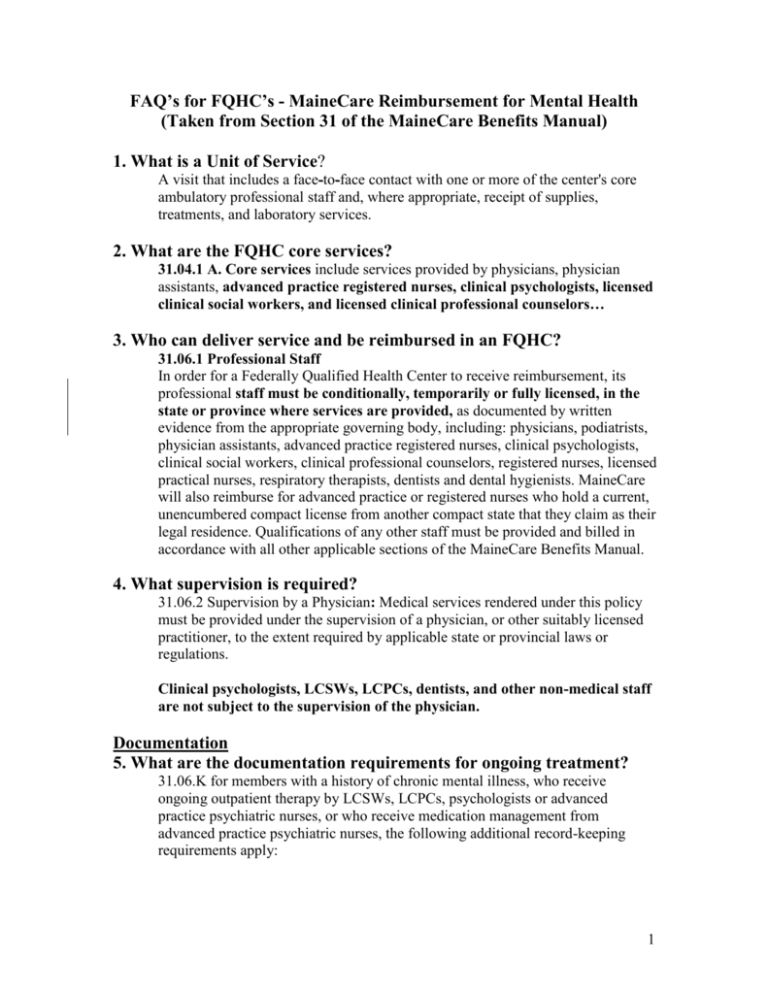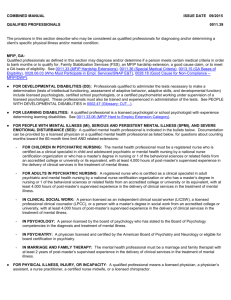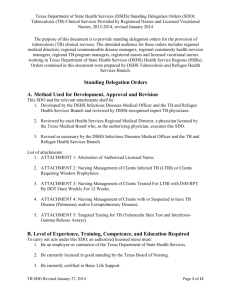FAQs for FQHC - Mental Health Guide
advertisement

FAQ’s for FQHC’s - MaineCare Reimbursement for Mental Health (Taken from Section 31 of the MaineCare Benefits Manual) 1. What is a Unit of Service? A visit that includes a face--to--face contact with one or more of the center's core ambulatory professional staff and, where appropriate, receipt of supplies, treatments, and laboratory services. 2. What are the FQHC core services? 31.04.1 A. Core services include services provided by physicians, physician assistants, advanced practice registered nurses, clinical psychologists, licensed clinical social workers, and licensed clinical professional counselors… 3. Who can deliver service and be reimbursed in an FQHC? 31.06.1 Professional Staff In order for a Federally Qualified Health Center to receive reimbursement, its professional staff must be conditionally, temporarily or fully licensed, in the state or province where services are provided, as documented by written evidence from the appropriate governing body, including: physicians, podiatrists, physician assistants, advanced practice registered nurses, clinical psychologists, clinical social workers, clinical professional counselors, registered nurses, licensed practical nurses, respiratory therapists, dentists and dental hygienists. MaineCare will also reimburse for advanced practice or registered nurses who hold a current, unencumbered compact license from another compact state that they claim as their legal residence. Qualifications of any other staff must be provided and billed in accordance with all other applicable sections of the MaineCare Benefits Manual. 4. What supervision is required? 31.06.2 Supervision by a Physician: Medical services rendered under this policy must be provided under the supervision of a physician, or other suitably licensed practitioner, to the extent required by applicable state or provincial laws or regulations. Clinical psychologists, LCSWs, LCPCs, dentists, and other non-medical staff are not subject to the supervision of the physician. Documentation 5. What are the documentation requirements for ongoing treatment? 31.06.K for members with a history of chronic mental illness, who receive ongoing outpatient therapy by LCSWs, LCPCs, psychologists or advanced practice psychiatric nurses, or who receive medication management from advanced practice psychiatric nurses, the following additional record-keeping requirements apply: 1 1. Initial Assessment/Clinical Evaluation. An initial assessment, which must include a direct encounter with the member, and his/her family if appropriate, shall be performed and included in the member's FQHC record. The assessment must include the member's medical and social history and must include the member's diagnosis and the professional who made the diagnosis and that person's credentials. 2. Individual Treatment/Service Plan. An individual treatment/service plan must be developed by the third mental health visit. This individual treatment/service plan shall be in writing and shall identify mental health treatment needs, and shall delineate all specific services to be provided, the frequency and duration of each service, the mental health personnel who will provide the service, and the goals and/or expected outcomes of each service. Treatment plans must be reviewed and approved by a psychiatrist, physician, psychologist, or licensed clinical social worker, licensed clinical professional counselor or advanced psychiatric and mental health nurse, or a registered nurse certified in the specialized field of mental health within thirty (30) days of entry of the member into mental health treatment. 3. Written treatment or progress notes shall be maintained in chronological order, and shall be made for each mental health visit. These notes shall identify who provided the service, the provider's credentials, on what date the service was provided, its duration, and the progress the member is making toward attaining the goals or outcomes identified in the treatment plan. The clinical record shall also specifically include written information or reports on all medication reviews, medical consultations, psychometric testing, and collateral contacts made on behalf of the member (name, relationship to member, etc.). 4. 5. In cases where FQHC mental health services are needed in excess of two hours per week to prevent hospitalization, documentation must be included in the file and signed by a psychiatrist, physician, psychologist, licensed clinical social worker, licensed clinical professional counselor or psychiatric nurse. 6. Discharge/Closing Summary. A closing summary shall be signed and dated and included in the clinical record of discharge treatment and outcome in relation to the individual treatment/service plan. 7. In the event a member receives group services, there shall be no names of other group participants in the member's record. Entries are required for each service billed and must include the name, credentials, and signature of the service provider. See Chapter I of the MaineCare Benefits Manual for additional record keeping requirements. 2 6. Can you be reimbursed for a medical and mental health service on the same day? 31.07.1 Reimbursement is generally limited to one core service visit, and/or one ambulatory service visit per day. Reimbursement for a second core visit is also covered if the member has both an encounter with a physician, physician assistant, advanced nurse practitioner or visiting nurse, and in addition to that encounter, is seen by a licensed clinical psychologist, clinical social worker, clinical professional counselor or a clinical nurse specialist licensed as a psychiatric registered nurse on the same day. An additional visit of any other kind will only be reimbursed for unforeseen circumstances as documented in the member’s record. The goal remains to treat the whole individual during one visit. 7. Can a patient be seen in their home? 31.04.3 Off-site delivery of services furnished by health center staff are reimbursable when they are provided away from the center and when it is documented in the member's chart that it is the most clinically-appropriate setting for the provision of services. Examples of off-site service locations include: a nursing facility, an emergency room, an inpatient hospital, or a member’s home. 8. What is required for Smoking Cessation? 31.04.2D Smoking Cessation Counseling will be reimbursed for up to three (3) sessions per calendar year, per member, per physician or other provider who is licensed to prescribe. Smoking cessation counseling may be billed alone, or in combination with other FQHC services. Documentation of the smoking cessation counseling must be contained in the medical record. Documentation must include: 1. an ICD-9 diagnosis code of 305.1 (tobacco use disorder); 2. an assessment of the member’s willingness to quit smoking, or of his or her progress in quitting; 3. documentation of any ongoing barriers to quitting or staying tobacco-free; and 4. a brief outline of whatever motivational or educational information was provided. 5. the name and license level of person providing the smoking cessation services. 3 9. What are the coding requirements? 31.09 Upon the implementation of MIHMS, providers billing for FQHC services must bill using standard CPT and HCPC procedure codes as detailed in Chapter III, Section 31, Table 1. For Core and Ambulatory Services, as described under Covered Services-Section 31. 04, providers must bill T1015 and include the appropriate revenue codes. When billing, providers must use a UB 04 claim form. Effective October 1, 2010, in addition to billing the code T1015 for Core and Ambulatory Services, providers must also report all services provided including all procedures with the standard CPT and HCPC5 codes on the UB 04 claims form for reporting purposes. 4







